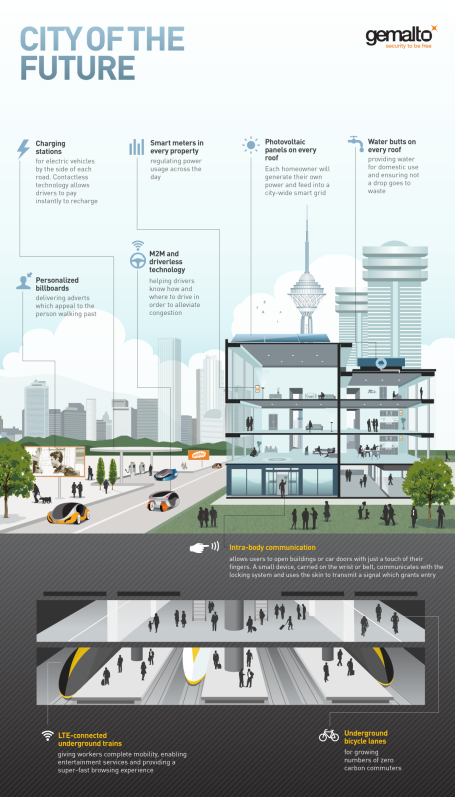Back in August 2013, we created a vision of how M2M technologies might change urban life in the future. Here’s the original graphic:
Fewer than two years later, our predictions still stand and progress in certain areas, such as connected cars, has been rapid. But continuing developments in the world of IoT and M2M have again broadened our horizons, and our recent IoTMaker Challenge saw a wide range of creative and innovative ideas suggested by our readers and the wider IoT community. So we thought we’d look at how some of these concepts might play out in our city of the future.
Firstly, @assenteismo’s suggestion of sensors to monitor river levels in Genoa is definitely something that would bring benefits to our residents. Bridges in the vicinity would be equipped with the sensors so they’d receive an early warning of any potential flooding risk and react before it happens.
In our original graphic we also considered the impact of smart meters in every property. We’re not quite there yet, but Hubert Gregoire had another suggestion to help energy efficiency. His idea for a smart lighting system, which detects the presence of people and automatically switches on and off accordingly, could result in huge power savings and efficiency gains if applied across the city in both residential and commercial properties. Motion sensitive lighting is of course commonplace already, but a more advanced geofencing system which detects occupants’ smartphones or other connected devices could deliver much improved results.
The emergency services always have an important part to play in any city, and this won’t change in the future. However, the way in which they are contacted might. Guillaume Chabas’s idea for a connected fire extinguisher, which we’ve looked at in more detail here, would see emergency services notified automatically as soon as it is used. In addition, it can alert maintenance services when it needs to be serviced or replaced. As a result, emergency response times will be faster, and the population will be that extra bit safer.
Other ideas from the shortlist can be applied to our future city – including sensors in food courts and restaurants which show new customers which tables are free, front doors which alert the owner if keys are left in the lock, and hotel rooms which detect the presence of their guests so housekeeping can take place without causing any disturbance.
What else would you like to see in the smart city of the future? Let us know in the comments, and be sure to check out our interview with Jason Mitcheson, our #IoTMaker Challenge winner, and the prototype we built of his idea for a 3G bushfire alert system.



